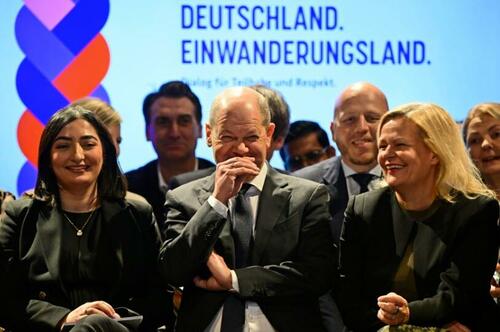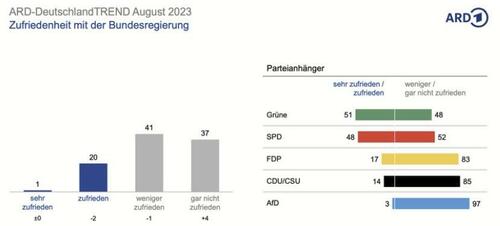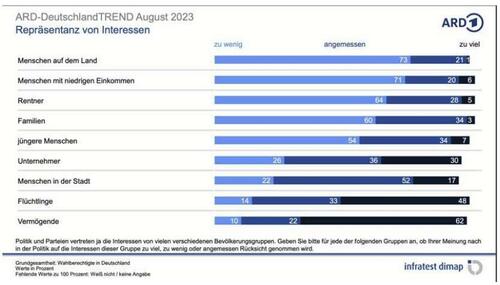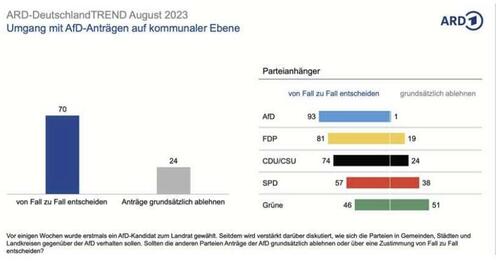
Authored by Thomas Brooke via Remix News,
A major political backlash against the traditional mainstream parties is brewing in Germany after recent polling showed that four in five Germans are dissatisfied with the government, and a majority of respondents believe the interests of ordinary people are ignored in favor of refugees and the rich.
German Chancellor Olaf Scholz is flanked by Commissioner for Migration, Refugees and Integration Reem Alabali-Radovan, left, and German Interior Minister Nancy Faeser, right, during an immigration meeting "Germany, Immigration Country, Dialogue for Participation and Respect" in Berlin, Monday, Nov. 28, 2022. (John MacDougall/Pool Photo via AP)
According to the ARD-DeutschlandTrend poll, 78 percent of respondents are unhappy with the direction in which the country is headed under the current coalition government of the socialists, liberals, and greens.
A total of 41 percent are dissatisfied with Chancellor Olaf Scholz’s administration, while 37 percent are very dissatisfied. In contrast, just 20 percent of respondents are somewhat satisfied with the government, and just 1 percent are very satisfied.
Unsurprisingly, supporters of the opposition CDU/CSU and the right-wing Alternative for Germany (AfD) are the least supportive of the current administration, with 85 percent and 97 percent against, respectively. However, voters of the liberal Free Democratic Party (FDP) are also overwhelmingly unhappy with the federal government, despite their party being a member of the coalition. Just 17 percent support the government currently.
Even a majority of the SPD, which spearheads the government and holds the most influential positions of chancellor and interior minister, do not currently support it, while only a slim majority of Green party voters are happy with the status quo — 51 percent in favor versus 48 percent against.
The polling revealed that many German citizens believe the government no longer represents their interests and instead panders to the rich and refugees.
A total of 73 percent of respondents stated that the federal government cares too little for the German people, while 71 percent believe that low earners are not a priority for the current administration.
In contrast, 62 percent believe the government caters too much to the wealthy, compared with just 10 percent who think the opposite. Similarly, 48 percent think that too much focus is placed on helping refugees compared to working-class Germans, compared with 14 percent who think the government isn’t doing enough to assist new arrivals.
The political landscape is ripe for an insurgent populist party to take advantage of the national mood which is one of disillusionment, and the right-wing Alternative for Germany (AfD) has picked up the mantle in that regard and is surging in polls across the country.
An exponential rise in support over the past 12 months sees the party now backed by almost one in four Germans, hitting a record high of 23 percent in an INSA survey for Germany’s Bild newspaper published on Sunday.
This support has translated into recent electoral gains, with the party winning its first mayoral election last month, a trend now giving the leaders of mainstream parties a headache as they contemplate whether or not to work with the anti-immigration, anti-globalist party at a local level.
German voters appear to back their parties working with the AfD on a case-by-case basis, with the ARD poll showing majorities among supporters of FDP (81 percent), CDU/CSU (74 percent), and the SPD (57 percent) in favor of cooperation. Only the Green party remains against working with the right-wing party, although the numbers here are in fact 51 percent against and 46 percent in favor.
The higher the AfD soars, however, the greater the reality of necessary cooperation with the party becomes.
Authored by Thomas Brooke via Remix News,
A major political backlash against the traditional mainstream parties is brewing in Germany after recent polling showed that four in five Germans are dissatisfied with the government, and a majority of respondents believe the interests of ordinary people are ignored in favor of refugees and the rich.
German Chancellor Olaf Scholz is flanked by Commissioner for Migration, Refugees and Integration Reem Alabali-Radovan, left, and German Interior Minister Nancy Faeser, right, during an immigration meeting “Germany, Immigration Country, Dialogue for Participation and Respect” in Berlin, Monday, Nov. 28, 2022. (John MacDougall/Pool Photo via AP)
According to the ARD-DeutschlandTrend poll, 78 percent of respondents are unhappy with the direction in which the country is headed under the current coalition government of the socialists, liberals, and greens.
A total of 41 percent are dissatisfied with Chancellor Olaf Scholz’s administration, while 37 percent are very dissatisfied. In contrast, just 20 percent of respondents are somewhat satisfied with the government, and just 1 percent are very satisfied.
Unsurprisingly, supporters of the opposition CDU/CSU and the right-wing Alternative for Germany (AfD) are the least supportive of the current administration, with 85 percent and 97 percent against, respectively. However, voters of the liberal Free Democratic Party (FDP) are also overwhelmingly unhappy with the federal government, despite their party being a member of the coalition. Just 17 percent support the government currently.
Even a majority of the SPD, which spearheads the government and holds the most influential positions of chancellor and interior minister, do not currently support it, while only a slim majority of Green party voters are happy with the status quo — 51 percent in favor versus 48 percent against.
The polling revealed that many German citizens believe the government no longer represents their interests and instead panders to the rich and refugees.
A total of 73 percent of respondents stated that the federal government cares too little for the German people, while 71 percent believe that low earners are not a priority for the current administration.
In contrast, 62 percent believe the government caters too much to the wealthy, compared with just 10 percent who think the opposite. Similarly, 48 percent think that too much focus is placed on helping refugees compared to working-class Germans, compared with 14 percent who think the government isn’t doing enough to assist new arrivals.
The political landscape is ripe for an insurgent populist party to take advantage of the national mood which is one of disillusionment, and the right-wing Alternative for Germany (AfD) has picked up the mantle in that regard and is surging in polls across the country.
An exponential rise in support over the past 12 months sees the party now backed by almost one in four Germans, hitting a record high of 23 percent in an INSA survey for Germany’s Bild newspaper published on Sunday.
This support has translated into recent electoral gains, with the party winning its first mayoral election last month, a trend now giving the leaders of mainstream parties a headache as they contemplate whether or not to work with the anti-immigration, anti-globalist party at a local level.
German voters appear to back their parties working with the AfD on a case-by-case basis, with the ARD poll showing majorities among supporters of FDP (81 percent), CDU/CSU (74 percent), and the SPD (57 percent) in favor of cooperation. Only the Green party remains against working with the right-wing party, although the numbers here are in fact 51 percent against and 46 percent in favor.
The higher the AfD soars, however, the greater the reality of necessary cooperation with the party becomes.
Loading…







